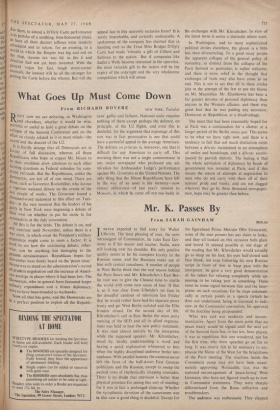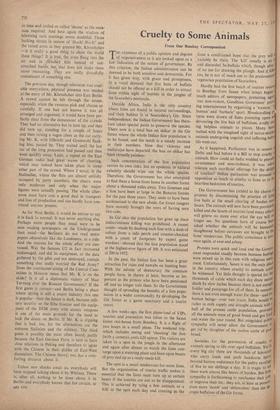Mr. K. Passes By
From SARAH GAINHAM
BERLIN
T NEVER expected to feel sorry. for Walter 1 Ulbricht. The least pleasing of men, the most intransigent of Communists, he rules East Ger- many as if his master and teacher, Stalin, were still looking over his shoulder. His only positive quality seems to be his complete loyalty to the Russian cause, and the Russians make use of him with cynical casualness. A number of people in West Berlin think that the real reason behind the Paris fiasco and Mr. Khrushchev's East Ber- lin visit was to give thee Chinese time to startle the world with some new cause of fear. If that is so it was clear from Ulbricht's set face in the dreadful candour of television last Friday that he would rather have had his separate peace treaty and get West Berlin isolated and the Elbe frontier closed. On the second day of Mr. Khrushchev'g call in East Berlin the mass party meeting of the SED and all its allied organisa- tions was held to hear the new policy statement. It was read almost entirely by the interpreter while the supposed speaker, Mr. Khrushchev, stood by, hardly understanding a word and having a quick explanation whispered to .him when the highly disciplined audience broke into applause. With painful honesty the cameras never left the faces of the half-dozen East German politicians and the Russian, except to sweep the packed rows of rhythmically clapping comrades. There is no doubt that television is better than physical presence for seeing this sort of meeting, for it was in fact a prolonged close-up. Whether the sycophantic devotion of the cameramen was in this case a good thing is doubtful. Except for the figurehead Prime Minister Otto. Grotewohl, none of the men present has any claim to looks, and they all looked on this occasion both glum and bored. It seemed possible at one stage of the reading that Mr. Khrushchev would actually go to sleep on his feet; his eyes half-closed and face blank, not even following his own Russian script in front of him to keep pace with the interpreter, he gave a very good demonstration of his talent for relaxing completely while ap- pearing to be taking part in something. There must be some signal between him and the inter- preter on, such occasions, for he claps automati- cally at certain points in a speech (which he does not understand, being in German) to indi- cate, in the Communist convention, his approval of the doctrine being propounded.
What was said was moderate and uncom- municative. Apart from the main point that no peace treaty would be signed until the next act of the Summit farce has, or has not, been played, it was so repetitious that one wondered, not for the first time, why these speeches go on for so long. It was clearly felt to be necessary to em- phasise the blame of the West for the breakdown of the Paris meeting. The reactions inside the Communist camp may not have been unani- mously approving. Noticeable, too, was the repeated encouragement of 'peace-loving' West Germans, who have not figured much up to now in Communist statements. They were sharply differentiated from the Bonn militarists and troublemakers.
The audience was enthusiastic. They clapped in time and smiled or called 'shame' as the occa- sion required. And here again the wisdom of televising such meetings seems doubtful. Those barking shouts in unison of 'Hoch! Hoch!' and the raised arms as they greeted.Mr. Khrushchev —is it really a good thing to silo* the World these things? It is true, the arms flung into the air end in efenched fists instead of out- stretched hands, but that does not make them more reassuring. They are really dreadfully reminiscent of something else.
The previous day, though television was avail- able everywhere, physical presence was needed at the entry of Mr. Khrushchev into East Berlin. A crowd cannot be felt through the screen, especially when the cameras pick and choose so carefully. if one had not known it was all arranged and organised, it would have been per- fectly clear from the demeanour of the crowds. They had no alternative but to turn up, and they did turn up, standing for a couple of hours and then raising a vague cheer as the car carry- ing Mr. K, with Ulbricht and Grotewohl flank- ing him, passed by. They waited until the last car of the long procession had passed and then went quickly away. Later, a repeat on the East German radio had great waves of cheering, which may indeed have taken place in some other part of the crowd. Where I stood, in the Stalinallee, where the flats are almost entirely occupied by party members, the cheers were only moderate and only when the major figures were actually passing. The whole after- noon must have cost a good deal in transport and loss of production and can hardly have con- vinced anyone present.
As for West Berlin, it would be untrue to say it is back to normal. It was never anything else. Perhaps more people than usual were to be seen reading newspapers on the Underground than usual—the Berliners do not read news- papers obsessively like the Londoners, as a rule. And the reasons for the whole affair are can- vassed. Was the famous U2 in fact recovered undamaged, and did its equipment, or the data- gathered by the pilot and not destroyed, contain something that really worried the Red Army? Does the continuous sitting of the Central Com- mittee in Moscow mean that Mr. K is on the skids? Is it all a diplomatic victory of Mao Tse-tung over the Russian Government? If the first guess is correct—and Berlin being a place where spying is still a major industry this one is popular—then the future is dark, because mili- tary security on the Elbe frontier and the equip- ment of the DDR army with atomic weapons is one of the main grounds for the need to lock the doors on Berlin.. If Mr. K is slipping that is bad, too, for the alternatives are the extreme Stalinists and the military. The third guess is possibly the most often heard, partly because the East German Party is said to have close relations in Peking and therefore to agree with the Chinese in their dislike of East-West discussions. The Chinese theory, too, has a com- forting distance about it.
Unless new shocks await us, everybody will have stopped talking about it by Whitsun. There is, after all, nothing to be done about it in Berlin and everybody knows that for certain, at any rate.







































 Previous page
Previous page